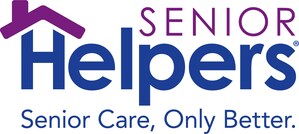BALTIMORE, June 21, 2016 /PRNewswire/ -- In honor of National Alzheimer's and Brain Awareness Month, Senior Helpers®, one of the nation's premier providers of personalized in-home senior care, today shared 10 telltale signs a loved one may be living with Alzheimer's or Dementia. With Baby Boomers now reaching age 65 and an individual diagnosed with the disease every 66 seconds*, the number of people diagnosed with the disease is expected to escalate rapidly over the coming years. According to Senior Helpers, recognizing and differentiating normal aging from symptoms associated with the disease will help caregivers and their loved ones identify the disease and develop a care plan sooner.
Leeza Gibbons, New York Times bestselling author and caregiver to both her mother and grandmother who lived with the disease, understands how challenging it can be to identify the signs of Alzheimer's or Dementia. "Life doesn't always go as planned. The people we love get sick and that is often when we face our biggest moment of truth. My mom was relatively young, just 55 years-old, when she started showing signs of the disease, including forgetfulness and behavioral issues with hygiene," said Gibbons.
In an effort to help families identify if a loved one may be living with Alzheimer's or Dementia, Senior Helpers offers the following 10 signs to look for:
- Memory Loss: Does your loved one experience trouble remembering NEW information or memory loss that disrupts daily life, such as forgetting important dates and events or asks for the same information repeatedly?
Normal aging: Occasionally forgetting names or appointments, but remembering them later. - Challenges planning and problem solving: Does he or she display difficulty with complex mental assignments, like following a recipe or with tasks that involve numbers, such as paying monthly bills?
Normal aging: Makes occasional errors during tasks like balancing a checkbook. - Difficulty completing familiar tasks: Have you witnessed him/her have trouble completing familiar tasks, such as driving to a favorite location, brushing their teeth or getting dressed?
Normal aging: Occasionally needs help to use the settings on a microwave or to record a TV show. - Confusion with time or place: Does he/she lose track of dates, seasons and time, or forget where they are or how they got there?
Normal aging: Experiencing initial confusion about the day of the week but figuring it out later. - Vision problems: Does he/she experience difficulty reading, judging distance and determining color or contrast? This may even include not realizing he/she is looking into the mirror.
Normal aging: Problems with vision changes related to cataracts. - Problems with speaking or writing: Does your loved one display trouble following or joining a conversation, and even repeat himself/herself or forget what they're talking about mid-conversation. Do you notice him/her being unable to find the right word or calling things by the wrong name?
Normal aging: Sometimes has trouble finding the right word. - Misplaces things and has trouble re-tracing steps: Do they sometimes put things in unusual places or are known to accuse others of stealing. This could also result in trouble re-tracing their steps.
Normal aging: Misplaces things from time to time, like glasses or keys. - Decreased or poor judgment: Does the individual illustrate poor judgment when dealing with money, or pay less attention in grooming or keeping himself or herself clean?
Normal aging: Makes a bad decision occasionally, such as an overly expensive purchase. - Withdrawal from work or social activities: Has your loved one begun removing himself/herself from social activities, hobbies, work place, etc.?
Normal aging: Sometimes feels weary of work, family and social obligations. - Changes in mood and personality: Does he/she become confused, suspicious, depressed, fearful or anxious? This sign may also result in becoming upset at home, work, with friends or any place they are out of their comfort zone.
Normal aging: Develops specific ways of doing things and becomes irritable when a routine is disrupted.
"Taking the next, appropriate steps after an Alzheimer's or Dementia diagnosis can be hard and often leaves caregivers wondering where to begin," said Chris Buitron, Senior Helpers vice president of marketing. "At Senior Helpers, we aim to minimize stress for both the senior and family members. By taking a positive approach to senior care with personalized plans, like our Senior Gems® Alzheimer's and Dementia Training Program, we help to identify the capabilities of a person living with the disease based on characteristics associated with its different stages, so we give the best care possible."
For more information on Alzheimer's and Dementia care from Senior Helpers, please visit http://www.seniorhelpers.com.
About Senior Helpers
Senior Helpers is the nation's largest premier in-home senior care company in the U.S. with over 270 franchised businesses operating across the country. Founded in 2001 with a vision to help seniors who wish to remain in their homes despite age-related illnesses and mobility challenges, Senior Helpers has now cared for tens of thousands of seniors with a pledge to provide "care and comfort at a moment's notice." Senior Helpers offers a wide range of personal care and companion services, including trained Alzheimer's, dementia and Parkinson's care, to assist seniors who wish to live independently. Learn more by visiting http://www.seniorhelpers.com.
*Alzheimer's Association
Logo - http://photos.prnewswire.com/prnh/20160509/365416LOGO
SOURCE Senior Helpers
Related Links
WANT YOUR COMPANY'S NEWS FEATURED ON PRNEWSWIRE.COM?
Newsrooms &
Influencers
Digital Media
Outlets
Journalists
Opted In



Share this article